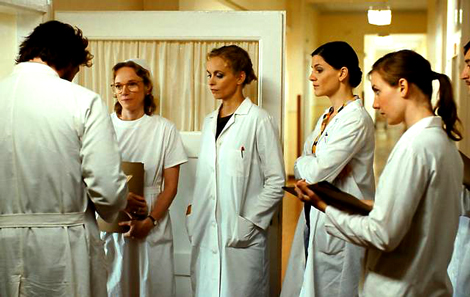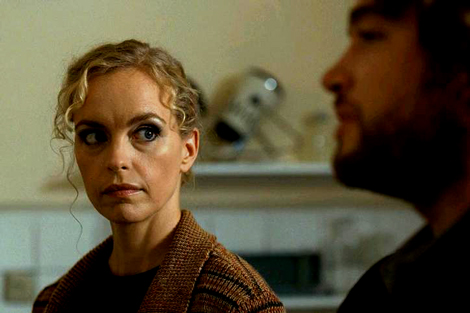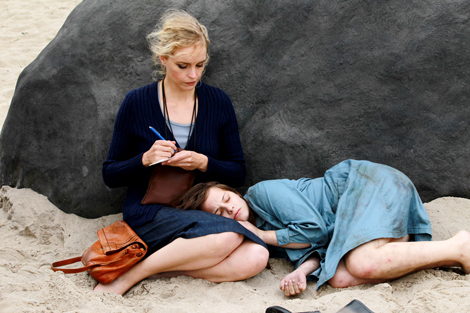|
|
Reviewed by Glenn Erickson
Films about the years under the Communist East German regime hold a certain fascination, whether they be productions by the East Germans themselves (The Legend of Paul and Paula, For Eyes Only: Top Secret, The Architects) or newer German thrillers such as The Tunnel and The Lives of Others. The new, award winning suspense piece Barbara is a low-key drama about an attempt to flee to the West that takes a wholly surprising turn of events. Americans tend to subscribe to the false notion that every citizen living East of the Iron Curtain was desperate to emigrate West by any means necessary. Barbara presents us with a less rigid viewpoint.

It is 1980. For submitting a request for an exit visa, Berlin doctor Barbara (Nina Hoss) has been punished with banishment to the provinces. Assigned to a small clinic, she refuses social contact with her fellow medical professionals. The local security policeman visits regularly, searching her new apartment; a policewoman performs a cavity search. This happens whenever Barbara uses her day off to leave the village for a few hours. Barbara does her best to evade the attentions of André (Ronald Zehrfeld). He's both a good doctor and a nice guy, but Barbara doesn't like his story explaining his presence in this backwater clinic. She gets André to admit that the security police expect him to inform on his staff. But Barbara cannot ignore the plight of her patients. The local workhouse for delinquent youth sees so many fatalities from sickness and suicide that it's considered a death camp. Young Stella (Jasna Fritzi Bauer) arrives screaming and wounded after yet another escape attempt, and clings desperately to Barbara for support. When she gets well, neither doctor can delay the girl's return to the camp. We finally discover the reason Barbara takes the train to the city on weekends -- she meets a lover from the West, who has a daring plan to help her flee the country altogether. As the big date arrives, Barbara is ready with her bicycle to leave in the middle of the night -- but by now she's already developed feelings of responsibility for her needy patients, and the dedicated Dr. André.
Miss a dialogue line early on in Barbara, and one might miss the reason why she's been sent far from the city and other suspected disloyal citizens. Otherwise, the script by director Christian Petzold and Harun Farocki very smartly lets us pick up what's going on through little hints and context. As the slim, serious-looking Barbara, Nina Hess makes a fascinating central figure. She's too proud, angry and smart to trip herself up; indeed, it looks as if living in the German Democratic Republic required total submission to the state, or a highly developed discipline of self-preservation. Barbara betrays nothing to the security man who studies her while her apartment is being ransacked. She shuns her co-workers partly to avoid situations where she might betray herself. And she puts up a cold wall against the attractive André, ignoring his prying questions. Who can say what separates innocent curiosity from intrusive political interrogation?

It's typical that movies about East Germany (by anyone but East Germans) show life to be an unrelieved political hell. Every citizen seems to be a direct victim of Red oppression. In general terms this was true, and Barbara has every reason to despise her government. What's being done to poor Stella makes the doctor's predicament seem minor. Unless Barbara was schooled elsewhere, the Reds made her a good doctor. She's impressed by Andrés attempt to set up a real medical lab in the little clinic; he's trying to secure equipment from overseas. How will it look when Barbara walks out on her associates, to secure for herself a "better deal" in the West? In an interesting scene, the security policeman is shown to have a wife dying from cancer. It looks as though André is sneaking morphine out of the clinic to make her death less painful. The security man is grateful -- a relative gives André a basket of fresh garden vegetables, which appear to be a rarity. The security man is just as much a victim of the system as anyone. It's possible that he also was banished to the provinces for some offense.
The suspense in Barbara doesn't depend on grandiose action scenes or hyper-dramatic confrontations and betrayals. If our heroine gets caught, we know it will most likely be a quiet, miserable little arrest. The suspense works on an intimate, personal level. Few relationships are out in the open, due to the scarcity of mutual trust. Barbara and André appear to have connected on a professional-sentimental level. Can she dare trust him?
Christian Petzold's film is a model of compassionate direction. Barbara seems insufferably cold until we witness the totality of her concern for her patients, and the comfort she tries to bring to Stella. Petzold balances these scenes of tenderness with the general hostility shown by people like her landlord, who is surely also watching her as well. The key image is of Barbara riding her bicycle to work, or to a secret meeting in the woods with her lover, or finally down the path to the beach. She hides money at a crossroads, narrowly avoiding being caught with it when the security men catch up with her. Petzhold shows us that life in East Germany might be like life in many countries, but with an extra layer of sinister security surveillance. I'll bet that East Germans said the same things we hear in the U.S. now: "If you're not doing anything wrong, you have nothing to fear." "Don't talk politics at work, you might offend the wrong person."

Adopt Films / Kino Lorber's Blu-ray of Barbara is an immaculate transfer of this attractive movie, which was shot on film and retains the lush colors of rural Germany. The soft outdoor light is pleasant in itself. Barbara's ugly apartment contrasts with André's cozy nest, showing the difference in treatment afforded "cooperative" professionals and presumed ingrates.

The movie is in Dolby Digital Stereo, and there are no extras. The language is German, with English subtitles.
Kino Lorber connects with many fascinating new productions every year. In the same batch with Barbara came a highly entertaining musical documentary, Greenwich Village: Music that Defined a Generation. I'll be reviewing it shortly.
On a scale of Excellent, Good, Fair, and Poor,
Barbara Blu-ray rates:
Movie: Excellent
Video: Excellent
Sound: Excellent
Supplements: none
Deaf and Hearing-impaired Friendly?
YES; Subtitles: English
Packaging: Keep case
Reviewed: November 4, 2013

DVD Savant Text © Copyright 2013 Glenn Erickson
See more exclusive reviews on the Savant Main Page.
Reviews on the Savant main site have additional credits information and are often updated and annotated with reader input and graphics.
Also, don't forget the
2011 Savant Wish List.
T'was Ever Thus.
Return to Top of Page
|

